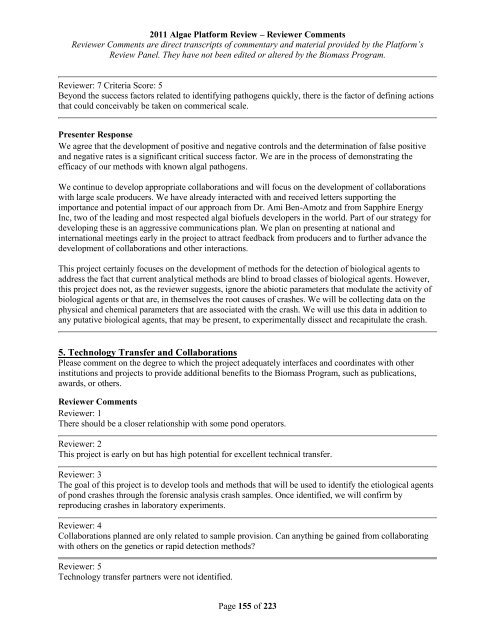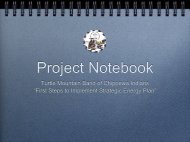Reviewer Comments - EERE
Reviewer Comments - EERE
Reviewer Comments - EERE
You also want an ePaper? Increase the reach of your titles
YUMPU automatically turns print PDFs into web optimized ePapers that Google loves.
2011 Algae Platform Review – <strong>Reviewer</strong> <strong>Comments</strong><br />
<strong>Reviewer</strong> <strong>Comments</strong> are direct transcripts of commentary and material provided by the Platform’s<br />
Review Panel. They have not been edited or altered by the Biomass Program.<br />
<strong>Reviewer</strong>: 7 Criteria Score: 5<br />
Beyond the success factors related to identifying pathogens quickly, there is the factor of defining actions<br />
that could conceivably be taken on commerical scale.<br />
Presenter Response<br />
We agree that the development of positive and negative controls and the determination of false positive<br />
and negative rates is a significant critical success factor. We are in the process of demonstrating the<br />
efficacy of our methods with known algal pathogens.<br />
We continue to develop appropriate collaborations and will focus on the development of collaborations<br />
with large scale producers. We have already interacted with and received letters supporting the<br />
importance and potential impact of our approach from Dr. Ami Ben-Amotz and from Sapphire Energy<br />
Inc, two of the leading and most respected algal biofuels developers in the world. Part of our strategy for<br />
developing these is an aggressive communications plan. We plan on presenting at national and<br />
international meetings early in the project to attract feedback from producers and to further advance the<br />
development of collaborations and other interactions.<br />
This project certainly focuses on the development of methods for the detection of biological agents to<br />
address the fact that current analytical methods are blind to broad classes of biological agents. However,<br />
this project does not, as the reviewer suggests, ignore the abiotic parameters that modulate the activity of<br />
biological agents or that are, in themselves the root causes of crashes. We will be collecting data on the<br />
physical and chemical parameters that are associated with the crash. We will use this data in addition to<br />
any putative biological agents, that may be present, to experimentally dissect and recapitulate the crash.<br />
5. Technology Transfer and Collaborations<br />
Please comment on the degree to which the project adequately interfaces and coordinates with other<br />
institutions and projects to provide additional benefits to the Biomass Program, such as publications,<br />
awards, or others.<br />
<strong>Reviewer</strong> <strong>Comments</strong><br />
<strong>Reviewer</strong>: 1<br />
There should be a closer relationship with some pond operators.<br />
<strong>Reviewer</strong>: 2<br />
This project is early on but has high potential for excellent technical transfer.<br />
<strong>Reviewer</strong>: 3<br />
The goal of this project is to develop tools and methods that will be used to identify the etiological agents<br />
of pond crashes through the forensic analysis crash samples. Once identified, we will confirm by<br />
reproducing crashes in laboratory experiments.<br />
<strong>Reviewer</strong>: 4<br />
Collaborations planned are only related to sample provision. Can anything be gained from collaborating<br />
with others on the genetics or rapid detection methods?<br />
<strong>Reviewer</strong>: 5<br />
Technology transfer partners were not identified.<br />
Page 155 of 223




